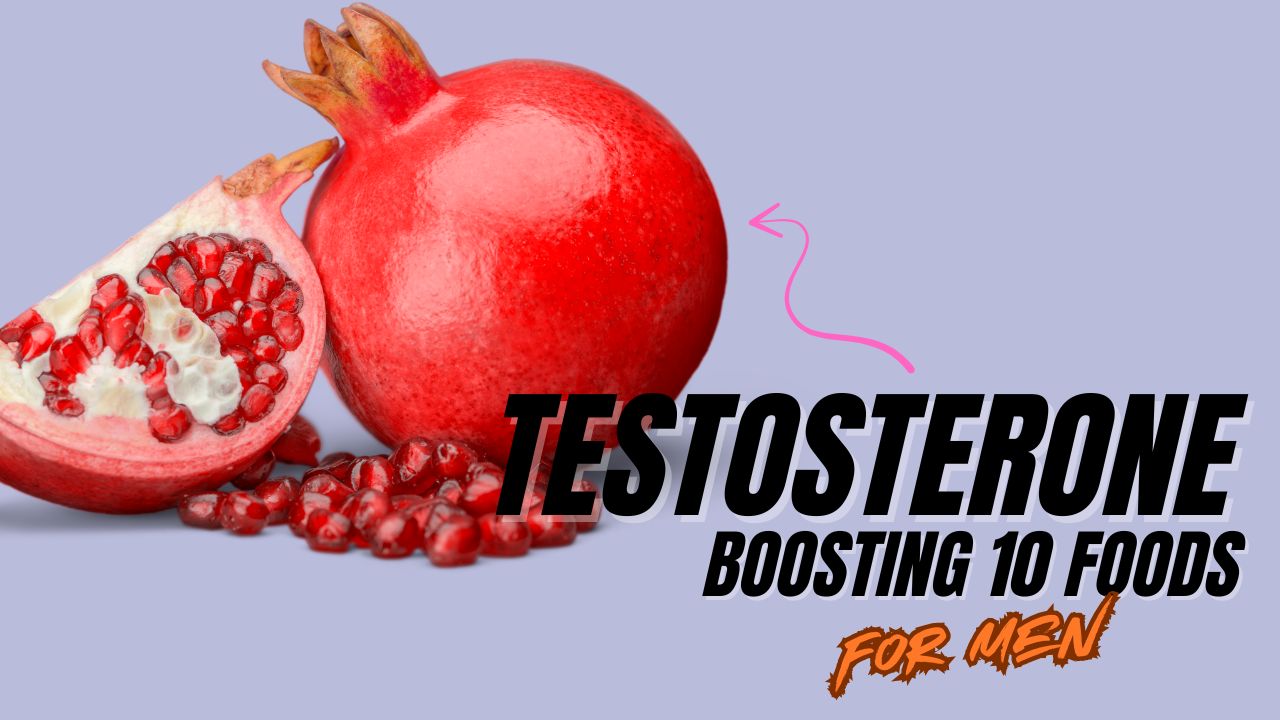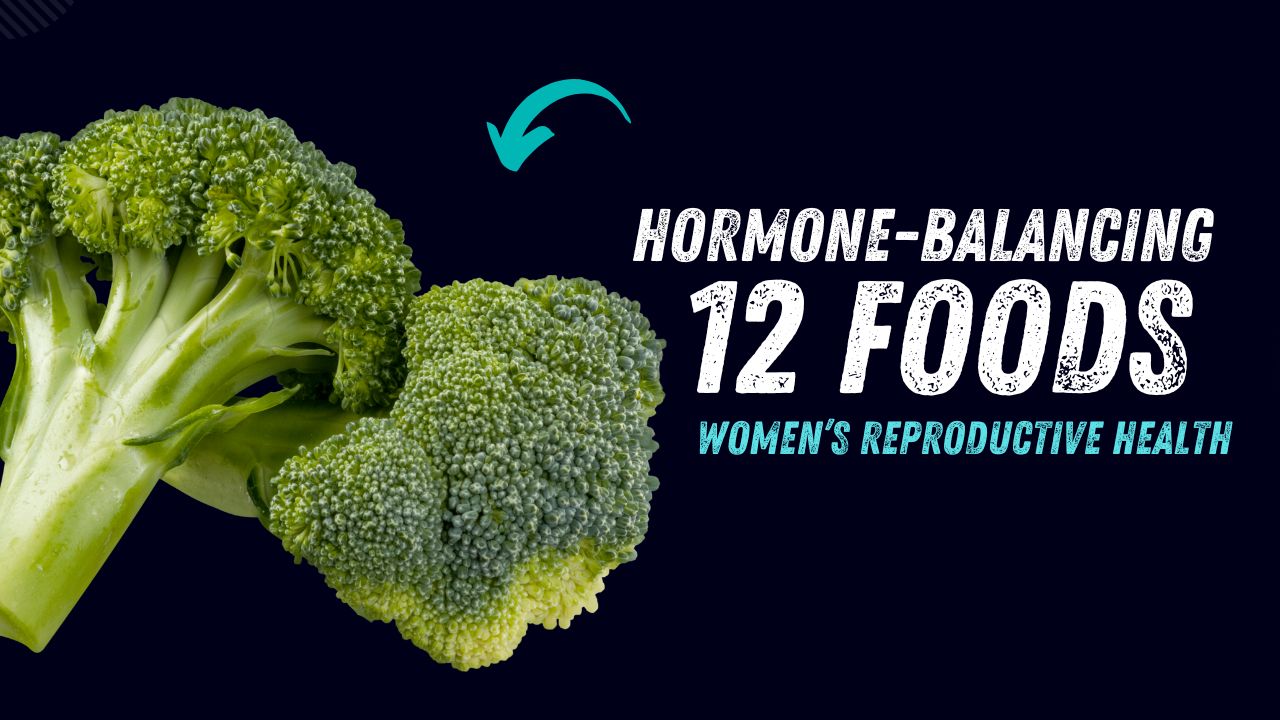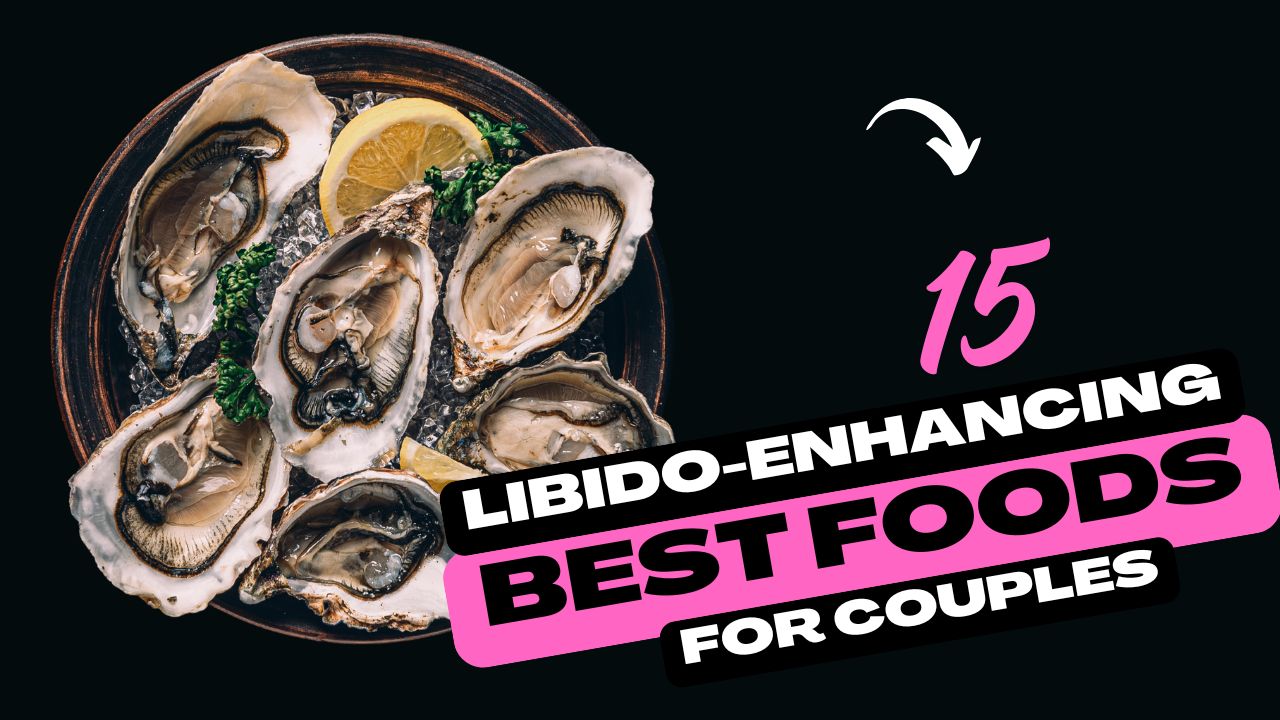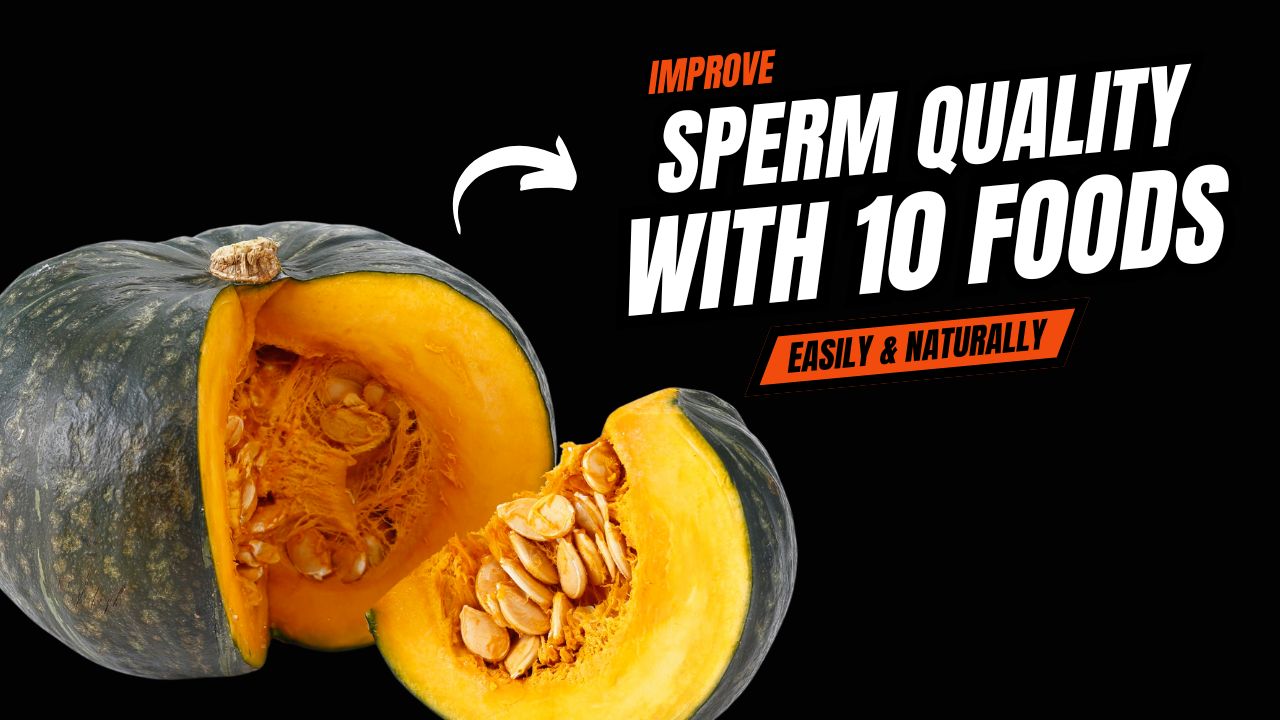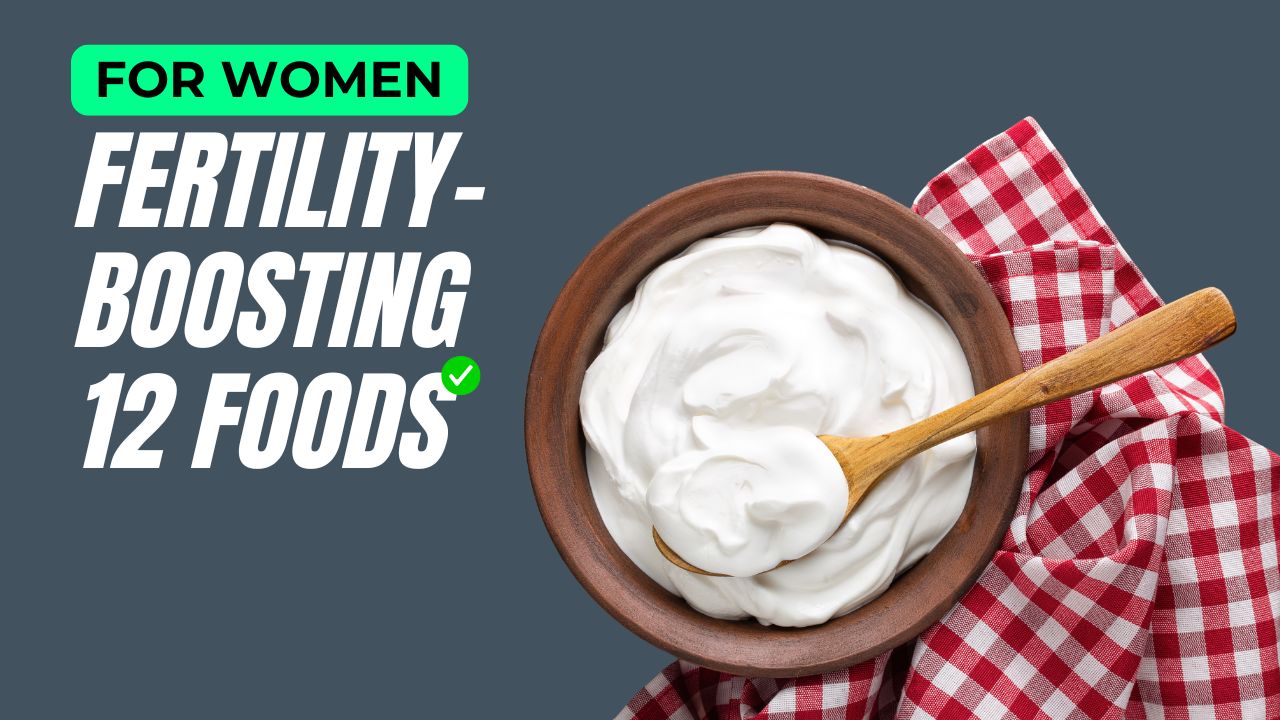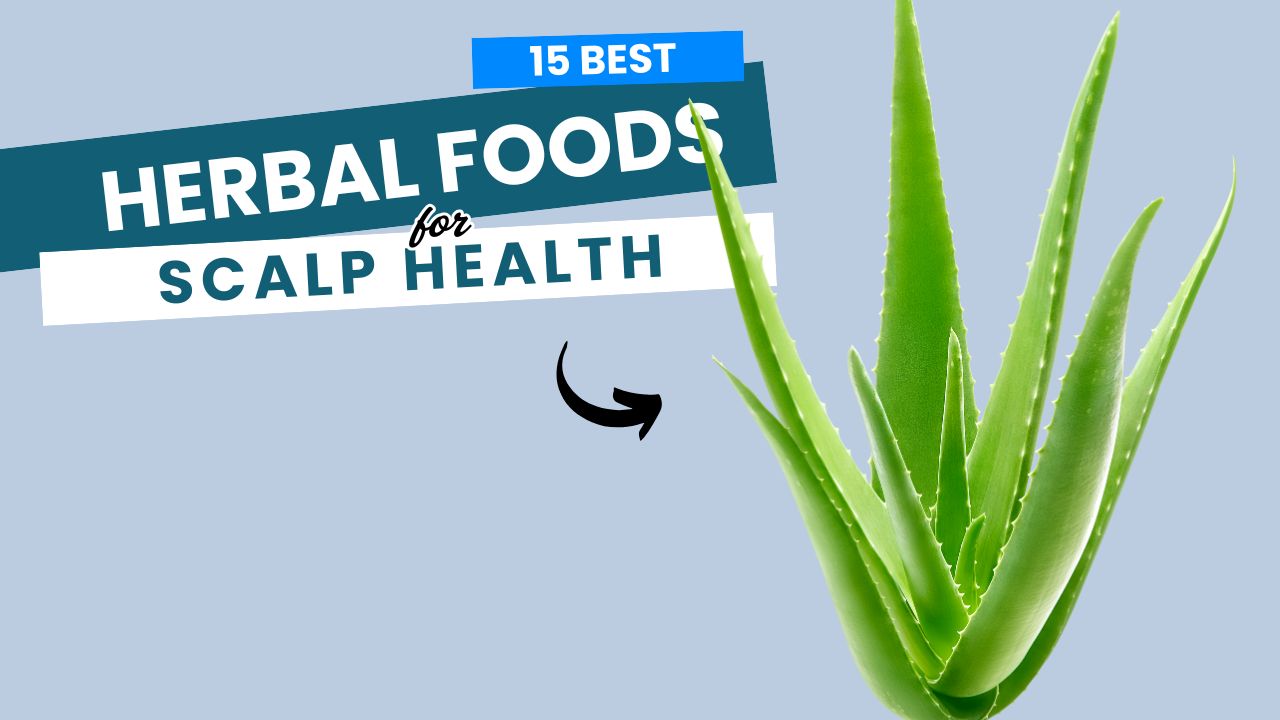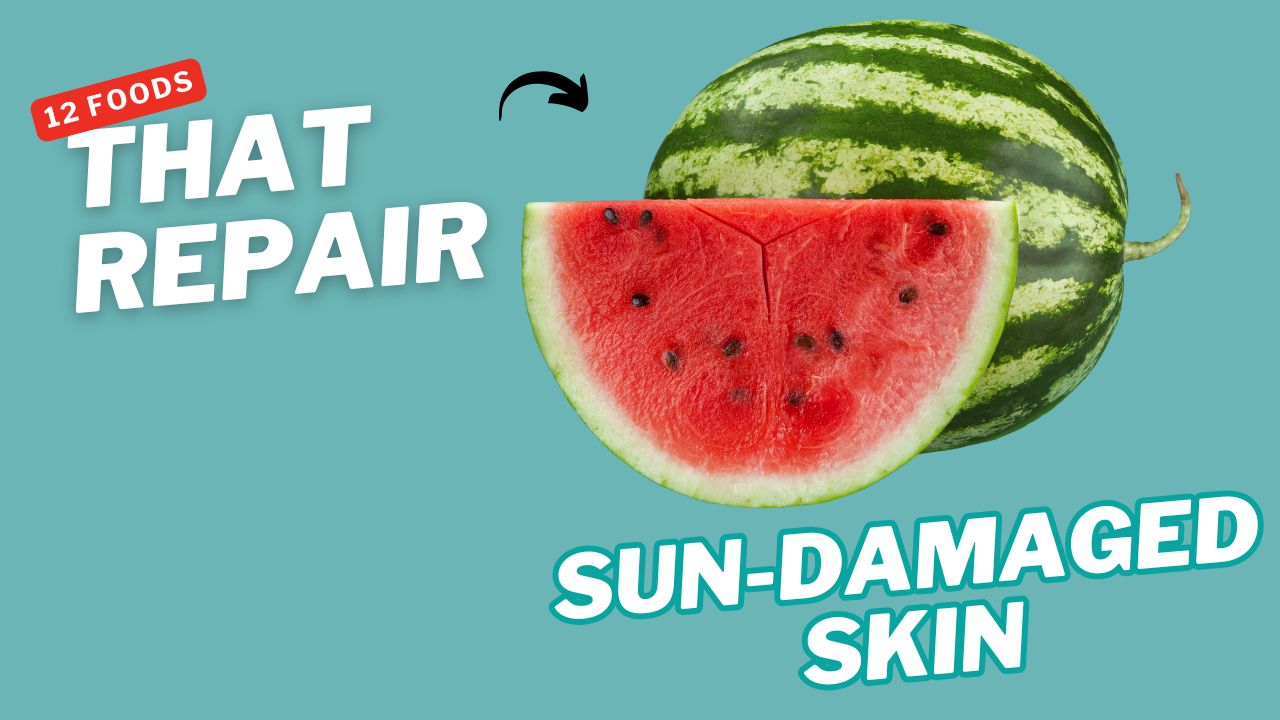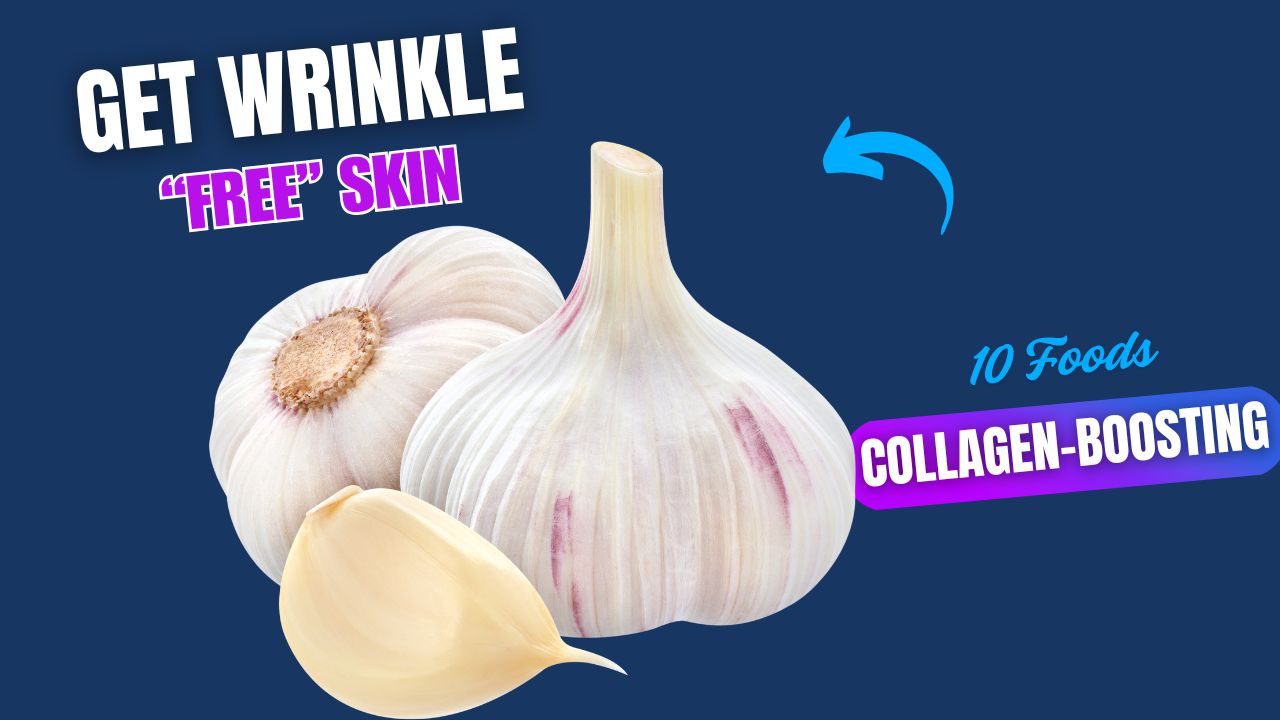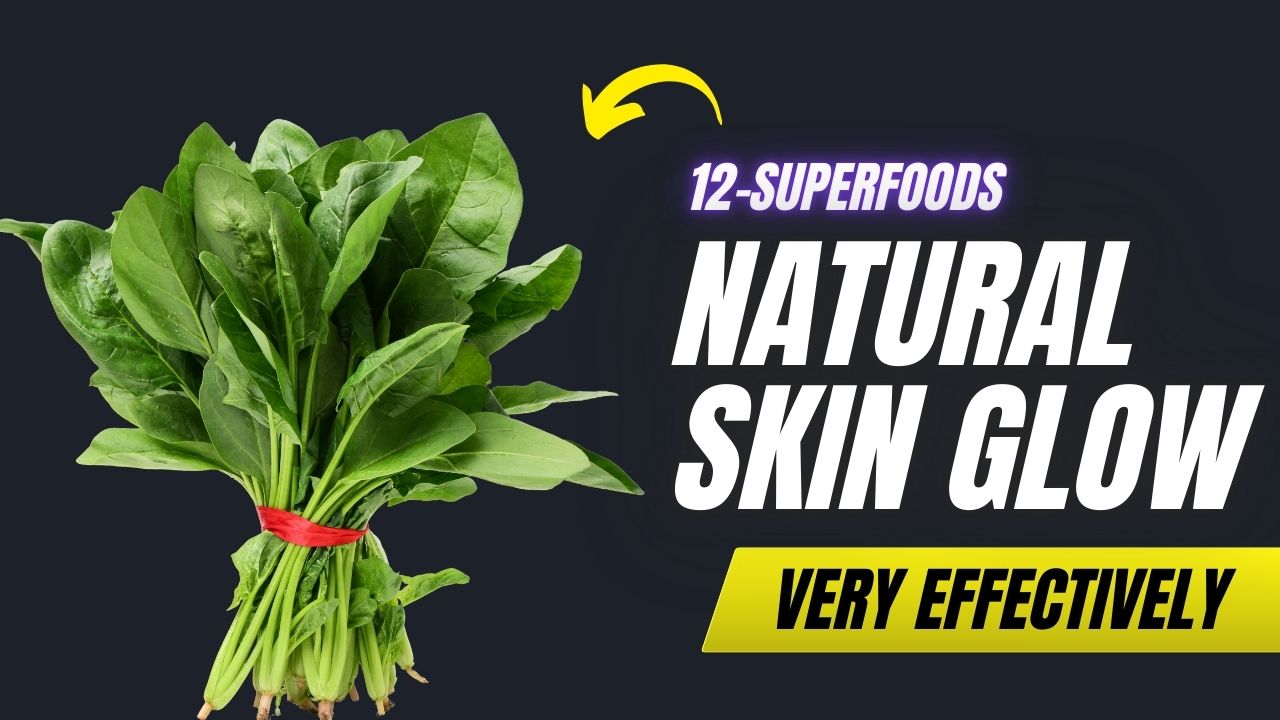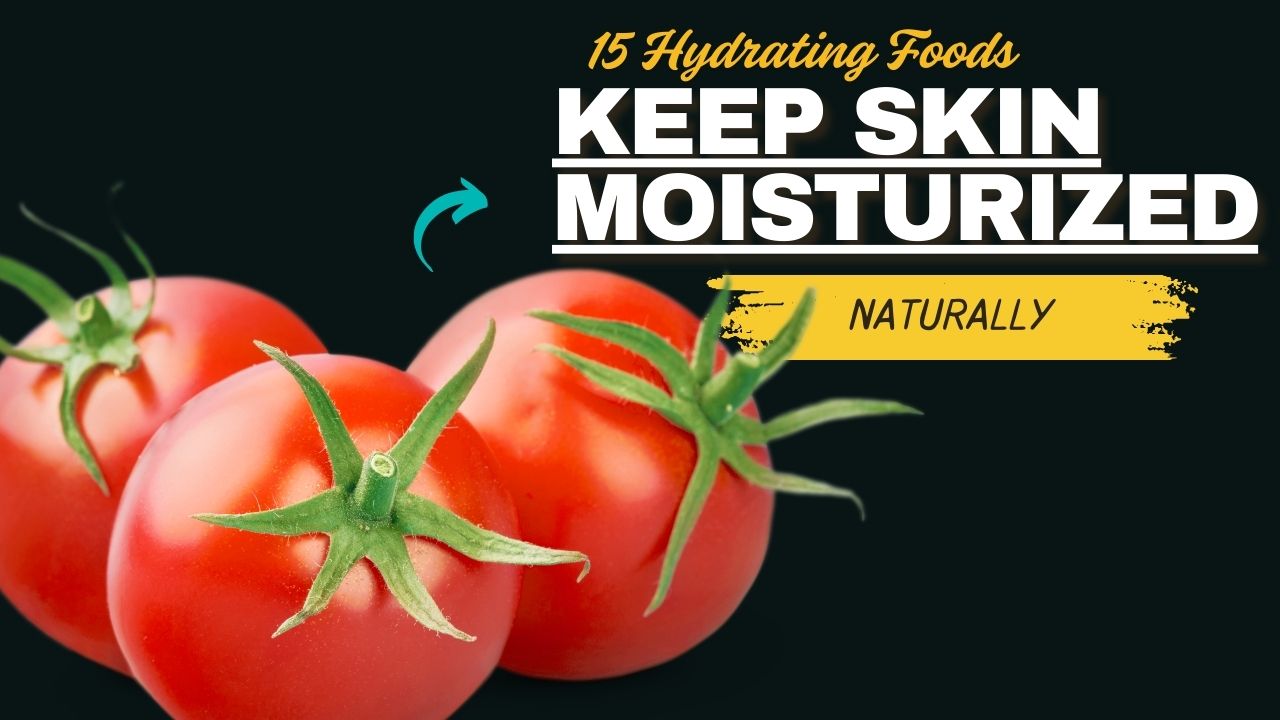Did you know that biotin deficiency was once believed to cause “egg white disease” because raw egg whites contain a protein that blocks its absorption?
This fascinating vitamin, also known as Vitamin B7, plays a vital role in supporting stronger hair, healthier nails, glowing skin, and energy metabolism.
If you’ve been struggling with brittle nails, thinning hair, or unexplained fatigue, biotin-rich foods might be the missing link in your diet. While supplements are popular, the best and safest way to boost your biotin intake is through natural foods.
In this post, we’ll cover:
- The top 10 biotin-rich foods to include in your diet.
- How to eat them for maximum benefits.
- Who should enjoy them (and who should be cautious).
- Storage tips, do’s & don’ts, and possible side effects.
Let’s dive in and discover how these foods can transform your hair, nails, and overall health.
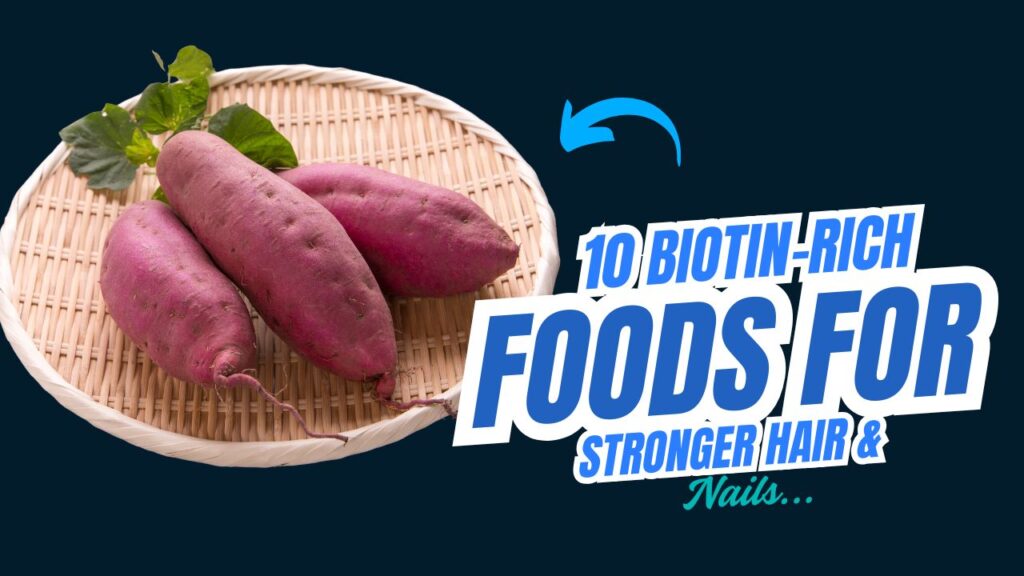
Table of Contents
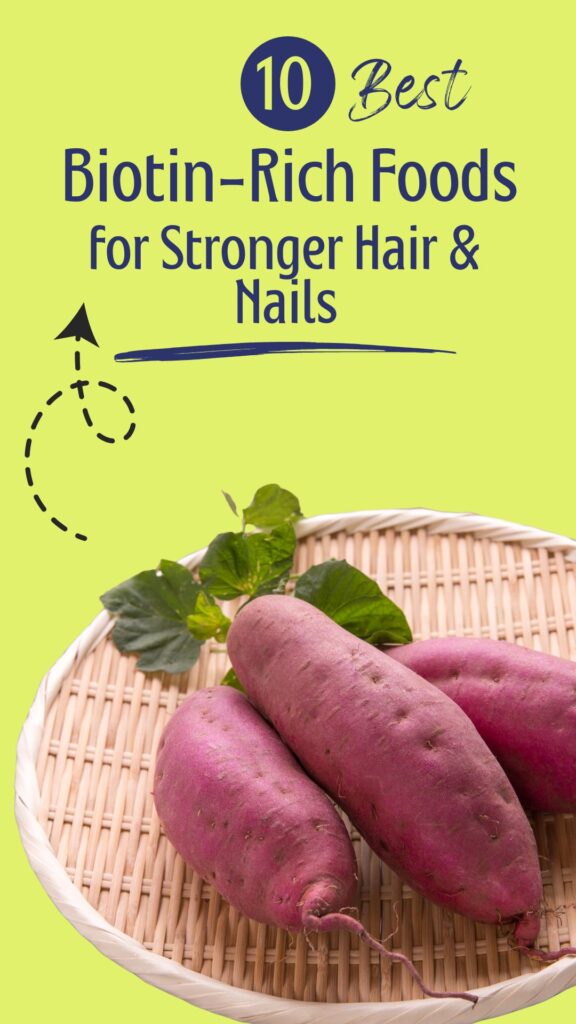
10 Biotin-Rich Food For Strong Hair & Nails
1. Eggs (Especially the Yolk)
Eggs are among the richest natural sources of biotin, with the yolk carrying most of the vitamin. They also provide protein, vitamin D, and healthy fats, making them a complete beauty food.
Best Ways to Eat or Use It
- Soft-boiled, scrambled, or poached for breakfast.
- Add to salads, sandwiches, or wraps.
- Avoid eating raw eggs, as the protein avidin binds biotin and prevents absorption.
Who Should Eat / Avoid
- Good for: athletes, people with hair loss concerns, and those needing extra protein.
- Avoid/Limit if: you have egg allergies or high cholesterol (consult a doctor).
Storage & Buying Tips
- Choose free-range or organic eggs for higher nutrient quality.
- Store in the refrigerator to extend shelf life up to 3–4 weeks.
Do’s & Don’ts
| ✅ Do | ❌ Don’t |
|---|---|
| Eat cooked eggs | Eat raw eggs |
| Combine with veggies for added nutrients | Store outside fridge |
Possible Side Effects
Excessive egg consumption may raise cholesterol in sensitive individuals.
2. Nuts and Seeds (Almonds, Walnuts, Sunflower Seeds)
Nuts and seeds are not only biotin-packed but also rich in vitamin E, omega-3s, and protein—perfect for glowing skin and hair.
Best Ways to Eat or Use It
- Snack on roasted almonds or walnuts.
- Sprinkle sunflower seeds on salads, yogurt, or oatmeal.
- Blend into smoothies or nut butter spreads.
Who Should Eat / Avoid
- Good for: vegetarians, vegans, weight watchers (in moderation).
- Avoid/Limit if: you have nut allergies.
Storage & Buying Tips
- Buy raw, unsalted versions for maximum health benefits.
- Store in airtight containers in a cool, dry place.
Do’s & Don’ts
| ✅ Do | ❌ Don’t |
|---|---|
| Store in airtight jars | Leave exposed to air |
| Eat as a snack | Overeat (high in calories) |
Possible Side Effects
Excessive consumption may cause digestive discomfort or weight gain due to high calorie density.
3. Sweet Potatoes
Sweet potatoes are not only rich in biotin but also provide beta-carotene, which converts into vitamin A for healthy skin and vision.
Best Ways to Eat or Use It
- Bake or roast for a side dish.
- Mash for a creamy texture.
- Add to soups, curries, or even desserts.
Who Should Eat / Avoid
- Good for: those with skin and hair issues, athletes, and weight-loss seekers.
- Avoid/Limit if: you have kidney problems (due to high potassium).
Storage & Buying Tips
- Select firm, unbruised sweet potatoes.
- Store in a cool, dark place—not in the fridge.
Do’s & Don’ts
| ✅ Do | ❌ Don’t |
|---|---|
| Bake or steam for nutrients | Deep-fry too often |
| Store in a cool pantry | Refrigerate (causes hardening) |
Possible Side Effects
Overeating may raise blood sugar levels in diabetics if not portion controlled.
4. Salmon
Salmon is a powerhouse of biotin, omega-3 fatty acids, and protein, making it excellent for hair and nail growth.
Best Ways to Eat or Use It
- Grill, bake, or steam for maximum nutrition.
- Add to salads, sushi, or pasta.
Who Should Eat / Avoid
- Good for: people with brittle hair, heart concerns, and skin dryness.
- Avoid/Limit if: pregnant women (due to mercury risk, choose wild-caught).
Storage & Buying Tips
- Buy wild-caught salmon if possible.
- Refrigerate fresh salmon and use within 1–2 days.
Do’s & Don’ts
| ✅ Do | ❌ Don’t |
|---|---|
| Grill or bake | Over-fry |
| Freeze if not using soon | Consume if it smells fishy |
Possible Side Effects
Excessive consumption may expose you to heavy metals depending on the source.
5. Avocados
Avocados are creamy fruits loaded with biotin, vitamin E, and healthy fats. They’re also known as “nature’s butter.”
Best Ways to Eat or Use It
- Spread on toast with lemon and pepper.
- Blend into smoothies or guacamole.
- Add slices to salads and wraps.
Who Should Eat / Avoid
- Good for: weight-loss diets (healthy fats promote satiety), skin and hair health.
- Avoid/Limit if: you have latex allergies or need to restrict fats.
Storage & Buying Tips
- Buy slightly firm avocados and let them ripen at room temperature.
- Store ripe avocados in the fridge for up to 3–4 days.
Do’s & Don’ts
| ✅ Do | ❌ Don’t |
|---|---|
| Eat ripe avocados | Eat unripe and hard |
| Store with lemon juice to prevent browning | Leave cut avocado exposed to air |
Possible Side Effects
Overeating can lead to excessive calorie intake.
6. Bananas
Bananas are a surprising source of biotin, along with potassium, fiber, and vitamin B6.
Best Ways to Eat or Use It
- Eat raw as a quick snack.
- Add to smoothies, oatmeal, or pancakes.
- Freeze for banana ice cream.
Who Should Eat / Avoid
- Good for: athletes, children, people with digestive issues.
- Avoid/Limit if: you have diabetes (monitor portion sizes).
Storage & Buying Tips
- Buy bananas slightly green to last longer.
- Store at room temperature.
Do’s & Don’ts
| ✅ Do | ❌ Don’t |
|---|---|
| Store at room temperature | Refrigerate unripe bananas |
| Use ripe bananas in baking | Leave in plastic bags |
Possible Side Effects
Excessive intake may raise blood sugar or cause constipation in some people.
7. Spinach
Spinach is a green superfood containing biotin, iron, magnesium, and folate.
Best Ways to Eat or Use It
- Add raw to salads or smoothies.
- Steam lightly to retain nutrients.
- Use in soups, stir-fries, or omelets.
Who Should Eat / Avoid
- Good for: vegetarians, anemic individuals, pregnant women.
- Avoid/Limit if: you have kidney stones (high oxalates).
Storage & Buying Tips
- Choose fresh, dark green leaves.
- Store in a perforated bag in the fridge for up to 5 days.
Do’s & Don’ts
| ✅ Do | ❌ Don’t |
|---|---|
| Wash before eating | Overcook (loses nutrients) |
| Add to smoothies | Store wet (causes spoilage) |
Possible Side Effects
Too much may cause bloating or kidney stone risk in sensitive individuals.
8. Mushrooms
Mushrooms are rich in biotin, selenium, and antioxidants, supporting hair growth and immune health.
Best Ways to Eat or Use It
- Grill or sauté with olive oil.
- Add to soups, omelets, or stir-fries.
Who Should Eat / Avoid
- Good for: vegans, vegetarians, immune-boost seekers.
- Avoid/Limit if: allergic or sensitive to fungi.
Storage & Buying Tips
- Store in paper bags (not plastic) in the fridge.
- Use within 5–7 days.
Do’s & Don’ts
| ✅ Do | ❌ Don’t |
|---|---|
| Store in paper bags | Wash and store wet |
| Cook lightly | Eat spoiled mushrooms |
Possible Side Effects
Some wild mushrooms are toxic—stick to edible varieties.
9. Dairy Products (Milk, Cheese, Yogurt)
Dairy provides biotin, calcium, and protein, essential for bone and hair strength.
Best Ways to Eat or Use It
- Drink milk with breakfast.
- Use yogurt in smoothies or dips.
- Add cheese to salads and whole-grain bread.
Who Should Eat / Avoid
- Good for: children, athletes, and bone health.
- Avoid/Limit if: lactose intolerant or allergic.
Storage & Buying Tips
- Store dairy in the refrigerator at 4°C or below.
- Consume before expiry dates.
Do’s & Don’ts
| ✅ Do | ❌ Don’t |
|---|---|
| Store cold | Leave unrefrigerated |
| Use in moderation | Consume expired dairy |
Possible Side Effects
May cause bloating or digestive discomfort in lactose-intolerant people.
10. Oats
Oats are a wholesome source of biotin, fiber, and iron, making them a perfect breakfast option.
Best Ways to Eat or Use It
- Cook as oatmeal with fruits and nuts.
- Add to smoothies or baked goods.
- Use overnight oats for convenience.
Who Should Eat / Avoid
- Good for: weight-loss seekers, athletes, and digestive health.
- Avoid/Limit if: you have gluten sensitivity (choose gluten-free oats).
Storage & Buying Tips
- Store in airtight containers in a cool, dry place.
- Use within 6 months for freshness.
Do’s & Don’ts
| ✅ Do | ❌ Don’t |
|---|---|
| Add fruits & seeds | Eat plain every day (monotony) |
| Store in airtight jars | Leave exposed to moisture |
Possible Side Effects
May cause bloating if eaten in excess.
Conclusion
From eggs to oats, these 10 biotin-rich foods are nature’s secret to stronger hair, healthier nails, and glowing skin. Instead of relying solely on supplements, adding these everyday foods to your meals can help you naturally boost your beauty and overall health.
Why not start today? Try swapping your usual breakfast with oats and nuts, or add avocado and salmon to your next salad. Small changes can make a big difference.
Which of these biotin-rich foods do you eat most often? Share your favorite recipes or meal ideas in the comments
Frequently Asked Questions (FAQs)
What are the best natural sources of biotin for hair and nails?
Some of the richest natural sources of biotin include eggs (yolks), nuts, seeds, sweet potatoes, salmon, avocados, spinach, and oats. These foods not only boost biotin levels but also provide other nutrients for overall health.
Can biotin-rich foods really help with hair growth?
Yes. Biotin plays a crucial role in keratin production, which is the protein that makes up hair, skin, and nails. While results vary, including biotin-rich foods in your diet supports stronger hair growth and reduces brittleness.
How much biotin do I need daily?
The recommended daily intake for adults is around 30–35 micrograms of biotin. Most people can meet this requirement through a balanced diet without supplements.
Is it better to get biotin from food or supplements?
Food is the best source of biotin, as it comes with other beneficial nutrients. Supplements may help if you have a deficiency, but they should only be taken under medical guidance.
What are the symptoms of biotin deficiency?
Signs of deficiency include thinning hair, brittle nails, dry skin, fatigue, and in severe cases, neurological issues. Luckily, deficiency is rare in people who eat a varied diet.
Are there any risks of eating too much biotin?
Biotin is water-soluble, meaning excess is usually flushed out of the body. However, very high doses of supplements may interfere with lab test results. It’s safest to rely on natural food sources.
